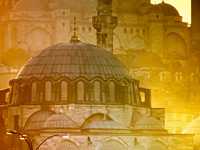By: Deborah Caldwell
Senior Editor, Enterprise
Turkey is as complex as a Byzantine mosaic or a potent Turkish coffee. Straddling Europe, Asia and the Middle East, it’s a Muslim country with ancient Christian roots — but founded as a modern nation in 1923 by a militant secularist, Mustafa Kemal Ataturk. For decades an economic backwater, it’s now the fastest-growing economy in Europe.

Getty Images
That economic success was achieved by an Islamist-leaning government that has managed successfully to meld the conservative religious devotion of the masses with the economic interests of the secular elite.
But what if Turkey, propelled by its majority of populist conservative Muslims, were to adopt a more extreme version of Islam? Syria, its neighbor to the south, is disintegrating — abetted according to some reports by rebels connected to Al Qaeda. Some of those rebels may be drifting across the border into Turkey. And there are rumors that Prime Minister Recep Tayyip Erdogan has intestinal cancer; with no clear successor to his decade-old leadership, his ruling Justice and Development (AKP) party could splinter and give rise to a more extremist Islamic rule.
Yet experts say Turkey is so much improved economically from a decade ago that there is little chance its people would risk that prosperity — and relations with the West — to adopt an extremist Islamic state.
That is not to say, however, that Turkey isn’t dealing with a precarious religious situation. “The society is going more conservative,” said Ebru Erdem, political science professor at the University of California at Riverside. “It’s been going on since the 1990s, and that is still in progress.”
Erdem said Turks who don’t fast during the holy month of Ramadan, for instance, or who drink alcohol, face ostracism. And last spring the AKP ignited a debate about the morality of abortion and C-sections, two issues Erdem said had never before caused so much as a flicker on the Turkish radar screen.
“They are not like the Islamist parties of before,” Erdem said. “They come from the same traditions, but they said they have taken off that shirt and they present themselves as a ‘liberal’ political party.”
Erdem and other Turkey experts liken the religious dynamic in Turkey to none other than the U.S., comparing the AKP to the most conservative Christians of the Republican Party.
“They are modeling on the Americans,” Erdem said. For instance, she said, the government has gradually begun regulating alcohol sales. “They say it’s not good for you, and they give the example of the U.S. Bible Belt, where you can’t buy alcohol on Sundays.”
via Investing In: What’s the Risk for Investors of Turkey Going Islamist? – US Business News – CNBC.